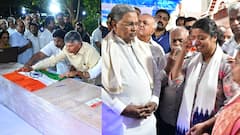Karnataka Hijab Row: Govt Order Dated Feb 5 Does Not Ban Hijab, AG Tells High Court
Referring to charges on the petition filed by the Muslim girls claiming the government order was illegal, Navadgi told HC that govt has delegated the power of deciding the school uniform to the CDCs

New Delhi: Arguing on behalf of the Karnataka government in the High Court on Friday, Advocate General Prabhuling Navadgi said that the government order dated February 5 did not ban the hijab and only delegated the authority to decide the school uniform to College Development Committees (CDC).
"The conscious stand of the state with all responsibility I state that we do not want to intervene in these kind of matters in so far as matter relates to religious symbols issues in the educational institutions," the AG told the full bench of the Karnataka High Court, led by Chief Justice Ritu Raj Awasthi, as quoted by news agency PTI.
Referring to the charges on the petition filed by the Muslim girls claiming the government order on February 5, restricting students from wearing a cloth which can disturb peace, harmony, and law and order, was illegal, and that it was issued without the 'application of mind’, AG Navadgi told the court that the state government took a conscious stand not to intervene in the matter related to religious symbols in educational institutions and has delegated the power of deciding the school uniform to the CDCs, comprising the local MLA.
During a hearing in connection with the Muslim girls' plea against the hijab ban at educational institutes, the AG said that the government has been ‘unnecessarily dragged’ into the matter when the CDC has been entrusted with the complete autonomy of deciding the uniform.
"The attack on the government on this government order saying that this is irrational, gives a communal colour and discriminates against the Muslim women, is absolutely without basis. It does not affect their rights. It is an innocuous order. The government has left it to the institutions on the issue of the uniform," PTI quoted Navadgi as saying.
Moreover, on the allegation of the petitioners' counsel that there was ‘non-application of mind’ vis-a-vis the order, Navadgi said the charges that some of the judgments cited in the government order were relevant while some were not.
He further explained the reason behind issuing the order restricting clothes that could disturb peace and harmony, and said that the intention was only to ask the students not to wear indecent dress.
On the charge that the order was against the headscarf, Navadgi said the question of hijab was not there, unless they wanted him to read something which he was unable to read and added that the petitioners unnecessarily dragged the state into the matter.
Navadgi also said that ever since the government order was passed on February 5, the state has not received any complaint about any CDC or a school having prescribed any resolution that has resulted to an unrest.
During the High Court hearing, the Advocate General limited his argument to broadly three points -- Hijab is not an essential religious practice of Islam, preventing its use did not violate Article 25 of the Indian Constitution and the government order that has been challenged by a few Muslim girls, from the Udupi government pre-university college, was in accordance with the law.
In the wake of the hijab controversy in educational institutes, the full bench of the Karnataka High Court, comprising Chief Justice Awasthi, Justice J M Khazi and Justice Krishna S Dixit, had passed an interim order restraining the students from wearing hijab or saffron scarves in the campus till a final order was passed.
The ongoing controversy can be traced back to January 1, when six girl students of a college in Udupi, attended a press conference held by Campus Front of India, protesting against the college authorities denying them entry into the classroom for wearing hijab.
This was four days after they had sought permission from the college principal to let then attend classes wearing hijabs, that was not allowed. Till then, they used to wear the headscarf to the campus and removed it before entering the classroom, the college principal Rudre Gowda had said.
According to Gowda, the college had no such rule on hijab-wearing since no one used to wear it to the classroom in the last 35 years. The students who came with the request had the backing of outside forces, the principal said.
The issue then spread across the state as several other schools and colleges issued similar diktats. The opposing groups of students started protesting both for and against the right to wear hijabs in the educational institutes. Those opposing the Muslim girls donned saffron scarves.
The row then escalated further with national political parties joining in to attack each other over the issue. The protests have further gained momentum by spreading to different parts of the nation and the matter is currently in the Karnataka High Court.





































